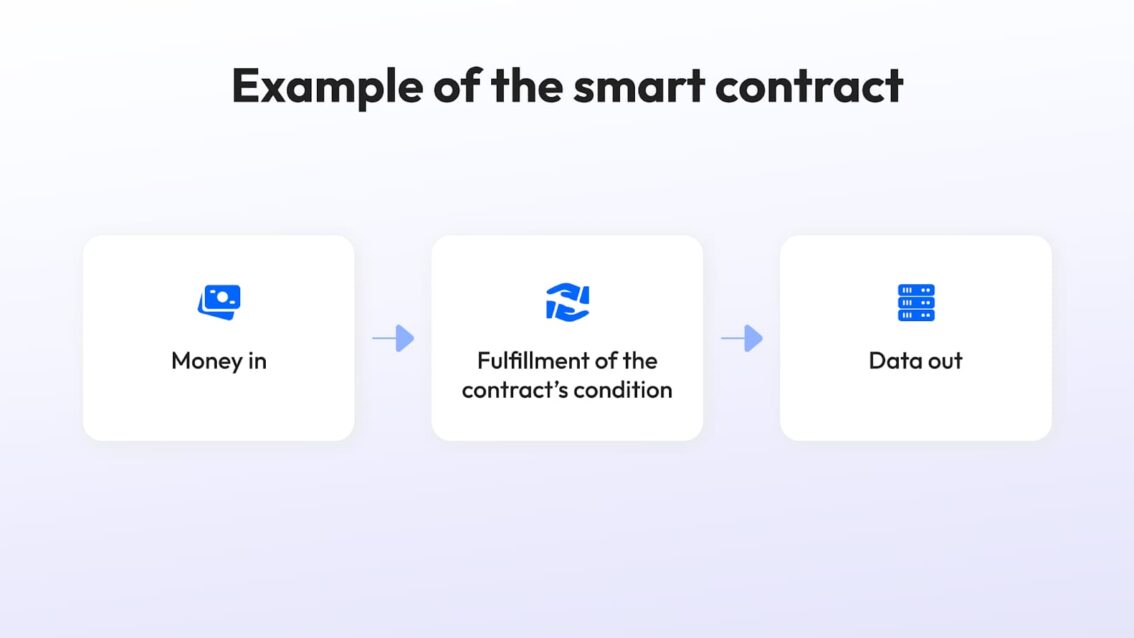Smart contracts are becoming integral to agreements across business domains, providing fast and trustworthy performance. The adoption of this blockchain technology is constantly increasing in various areas. In this article, we look at the mechanics of how smart contracts function, their reliability, and their benefits to clarify their transformative influence on companies worldwide.
Smart Contract: What is It?
Smart contracts are a revolutionary blockchain-based technology that enables automated actions triggered by predetermined activities. Unlike traditional agreements, smart contracts are created to resist hacking and operate autonomously. By bypassing intermediaries, they promote impartiality and openness, encourage optimization, and build trust among transaction participants.
Smart contracts were previously employed only for cryptocurrency transfers. Still, with blockchain’s evolution and growing influence on other industries, different business domains are increasingly embracing this tool. For instance, smart contracts are among the most popular blockchain solutions for real estate, fintech, healthcare, logistics, etc.

Smart Contracts’ Work Principle
Smart contracts adhere to blockchain organizational principles. Understanding the primary logic of foundation technology is critical to comprehend how it works.
Blockchain is a secure system characterized by its stability and immutability. Any data uploaded to the blockchain becomes part of an unchangeable chain in which each part is connected to others. Transforming one block mandates modifying all previous ones, which is challenging due to the complex cryptographic and computing procedures implicated in making further blocks.
Decentralized Ledger Technology (DLT) (which blockchain is by its essence) distributes ledger duplicates to all participating computers (nodes). A smart contract code one node enters is automatically distributed to all other nodes in the blockchain network.
Smart contracts initiation is identical to cryptocurrency transactions, starting with the user’s wallet.
However, innovation contract transactions have unique characteristics that distinguish them from conventional transactions:
- Compiled code: Smart contract transactions contain compiled code representing the agreement’s digital DNA, like a blueprint transforming into a functional entity on the blockchain.
- Recipient address: Smart contract transactions are routed to specific recipient addresses, distinguishing them from standard trades.
Launching matching transactions initiates the transfer of a smart contract to mine new blocks on the blockchain. The code is then unpacked in its block, integrating the contract into the overall blockchain.
Smart contracts fulfill various critical functions for blockchain ecosystems. These include enabling protected and efficient transactions, quality fund administration, financial trades between different arrangements, persistent data storage on the blockchain, and cryptocurrency transaction optimization.

Tech Tools Behind Smart Contracts
Smart contract assembling requires a special mix of necessary details and an in-depth knowledge of procedural intricacies. Here’s a customized roadmap outlining all the prerequisites:
Blockchain basis: Since smart contracts are blockchain-based, they require it for deployment and execution. Each blockchain, from Ethereum and Bitcoin to NEO, Hyperledger, and Waves, offers its ecosystem for customizing smart contracts.
Code arsenal: Building smart contracts mandates using specialized programming languages like Ethereum’s Solidity and Vyper. These languages supply the syntax and utilities essential to creating the contract’s logic and behavior.
Cryptocurrency: Using a native blockchain currency, such as Ether (ETH), for the Ethereum sphere facilitates seamless and faster transactions and interchanges with the contracting sphere.
Steps Required to Construct a Smart Contract
Smart contract assembling implies passing these steps:
Preliminary preparation: Identify suitable programming tools, including blockchain product platforms, integrated development environments (IDEs), and seamless blockchain network connectivity. Then, find experts who have experience with the technologies you need.
Goal formulation and architecture planning: Start by clarifying the smart contract’s purposes and needs and interpreting its functionality, terms, and interactions. Thus, a contract architecture and structure will be constructed to fulfill these aspirations.
Development: Experienced blockchain experts utilize technology to integrate a smart contract in a digital environment. Before deploying, the experts conduct a series of tests to confirm the contract’s dependability, safety, and functionality.
Deployment: After creating and testing the smart contract code, deploy it to the blockchain by transmitting and incorporating it into a distributed ledger that engages all network parties.
Proven software specialists with blockchain development experience can help you navigate the technicalities and streamline the process.
The Primary Benefits of Smart Contract Implementation
Smart contracts deliver numerous benefits to business owners after their integration. Let’s unveil how you can use them to your advantage:
- Improved safety. Due to blockchain-based cryptographic hashing and distributed ledger mechanisms, smart contracts deliver significant protection against hackers or counterfeiters and the integrity of business transactions.
- Cost-efficiency. Smart contracts accelerate payment procedures by introducing swift transactions and decreasing expenses. By implementing this technology, you can avoid extra fees and bureaucratic burdens, gaining excess time and financial resources.
- Standardization. Coded terms in a smart contract offer the same terms to all parties involved, ensuring fairness to all stakeholders.
- Accuracy and error-free. Smart contract automates accepting transactions, allowing you to avoid the risks of human error and associated subsequent complexities.
- Transaction transparency. Blockchain technology records every modification without the opportunity for further transformations. This feature allows smart contracts to deliver increased transparency, providing all stakeholders with complete transaction information.
- Autonomy. Smart contracts are entirely autonomous and not subject to the authority of any central governing body. In this way, they always adhere to set rules without needing external intervention.
Things to Consider for Successful Smart Contracts Integration
To integrate smart contracts successfully, you should deeply understand several critical matters that can affect their operation:
Inflexibility
Smart contracts are inflexible, so the initial terms cannot be edited later. As such, you must thoroughly test and validate all your ideas during the development. Moreover, you should consider adaptability when developing contingency plans, such as forming secondary smart contracts. Their implementation will be the only way to adjust or cancel the actions of previous ones.
Possible human mistake
Although smart contracts are digital technology, humans still create them. Thus, any error in an engineer’s code may lead to unfavorable financial outcomes. To avoid unpleasant situations, entrust smart contract development to experienced architects acquainted with technology’s intricacies. The specialists also check strict testing and code verification processes.
Data transferring issues
Smart contracts depend on up-to-date details to assess whether all the conditions for their realization are met. However, blockchain technology’s specifics restrict the ability to review real-time data. Oracle platforms can help solve this problem by serving as a conduit for delivering information to smart contracts.
Legal nuances
Smart contracts have no defined legal status, complicating their usage in some regions. However, governments have started to address this issue by focusing their legal efforts on the digital sphere.
Smart Contracts Future in Business Environment
Smart contracts have the potential to transform modern business solutions, particularly in integration with other technologies:
1. Synergy with IoT: Smart contracts can leverage real-time data from IoT devices, enhancing process optimization and efficiency across industries as IoT adoption grows.
2. Cloud Computing: By utilizing cloud computing, blockchain networks can solve scalability problems and optimize data processing and storage.
3. Decentralized Applications (DApps): Smart contracts form the foundation of DApps, enabling decentralized procedures with enriched protection and privacy. DApps boost confidence and clarity through peer-to-peer interaction, driving innovation in various industries.
In summary, combining cutting-edge technologies and blockchain smart contracts can revolutionize business processes and shape the future digital economy.